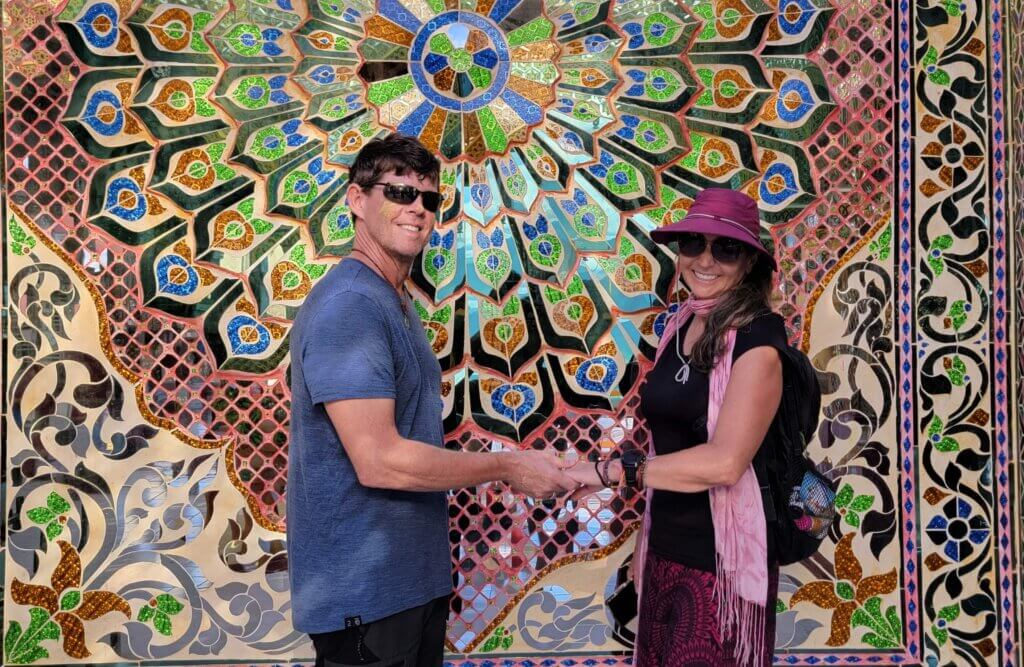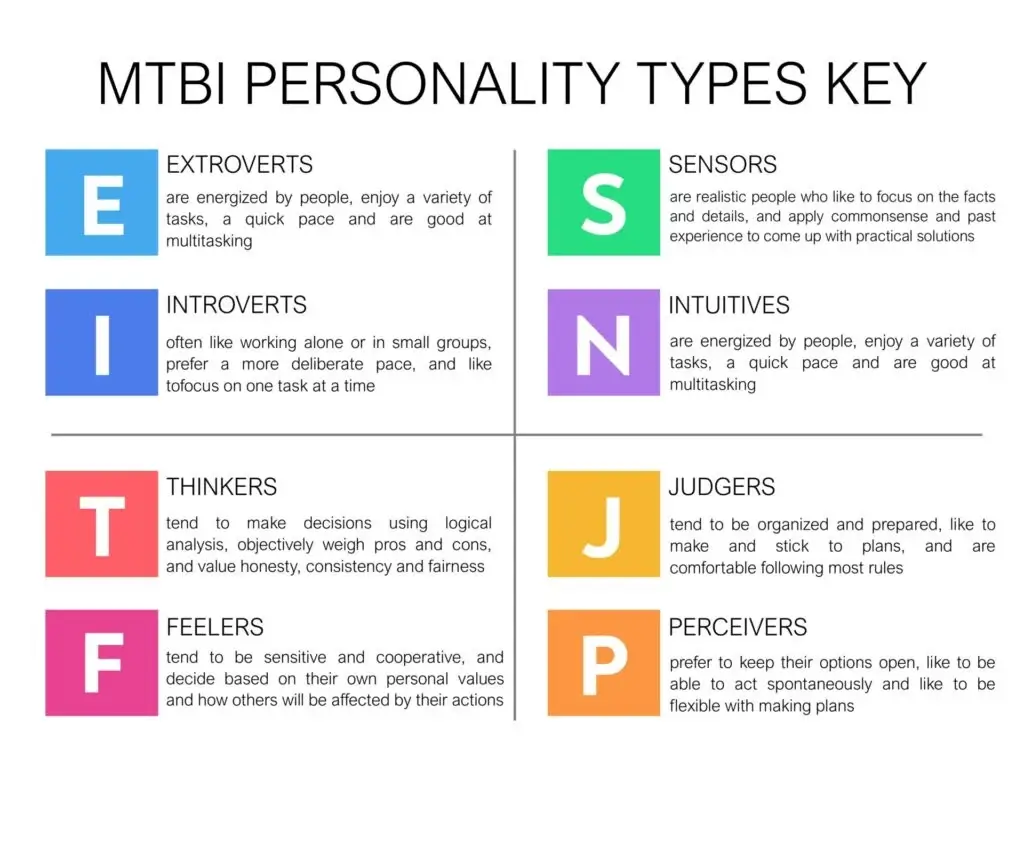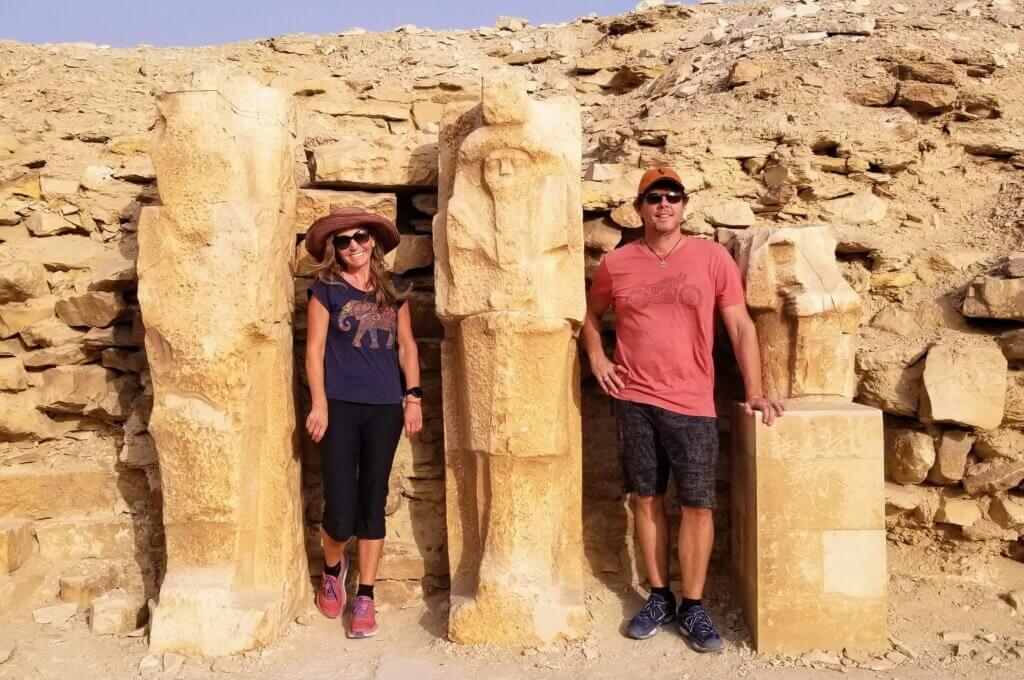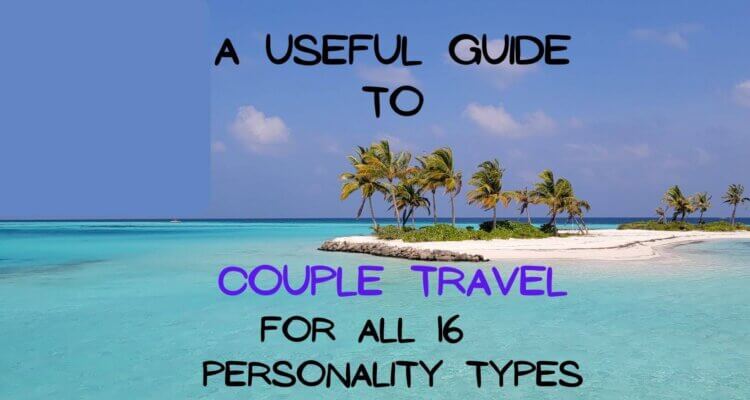Couple travel can be a great way to bond, explore new places, and make memories that will last a lifetime. But it can also be challenging, especially if you and your partner have different personality types.
That’s where the Myers-Briggs Type Indicator (MBTI) comes in. The MBTI is a personality test that helps you understand your own personality type and the personality types of others. Once you know your MBTI type, and the MBTI type of your partner you can use this information to plan your couple travel in a way that makes the most of your differences.
Our Couple Travel Journey

We have been traveling together for decades as tourists. And in 2017 we officially became nomads and started our couple travel journey 24/7. Many people, including my beloved mother in law would ask repeatedly, “How do you do it? You are together ALL the time and you seem happy?!”
Yup, we are happy being together 99% of the time. And if we are ever apart, even for a short time we spend the whole time texting each other. However we are not angels – especially me. So we still have to work on our relationship just like everyone else.
There are so many lessons that we have learned along the way. And one of the tools that has helped us the most is the MBTI Personality Type indicator.
Personality Types – MBTI

The Myers-Briggs Type Indicator (MBTI) is a “test” (with no right or wrong answers). It has helped us understand our own personality type and the personalities of others. MBTI sorts people into 16 different personality types, and each type has its own unique set of strengths and weaknesses.
You may have taken this “test” in high school to help you figure out the best career path for your “type”. Or perhaps a marriage counselor has give you this test? If you haven’t yet and would like to see what your personality type is, then we recommend this free MBTI based test.
For full disclosure I am an ENFP and Rob is an ISTP. Pretty much opposites. In any relationship, they say that you should at least have one of the preferences (letters) be the same. And thankfully we do. We are two P’s in 2 very different pods!
Introversion (I) Vs. Extroversion (E) – Communication Styles

The biggest personality type difference, particularly for couple travel is Introversion vs. Extroversion. This is especially true as it relates to communication styles and where we get our energy.
Introverts tend to be more reserved and prefer to communicate in smaller groups or one-on-one. They may take time to process information before speaking, and they prefer to listen more than they talk. Therefore introverts will process information inside their head, think through the answer or decision and only when ready they will speak.
In addition, I’s get energy from themselves. Other people (even their beloved partner) draw energy from them. I’s need time to recharge by themselves. An introvert can be with his or her best friends having a great time at their favorite destination. Yet at some point in the day, you will find that introvert in their own room, quietly reading some emails and recharging.
Extroverts, on the other hand, tend to be more outgoing and prefer to communicate in larger groups. They may be more comfortable speaking up in meetings or social situations, and they may enjoy talking about themselves and their experiences.
Extroverts process information outside of themselves. Meaning that an extrovert will talk through their decision or answer. They will talk and talk and at the end of it, will be their answer. In addition, E’s get their energy from others. So they need that interaction to get recharged.
These differences are what can cause some of the biggest conflict between E’s and I’s. Think about it, I’s like solitude and quiet. While E’s like a party with a lot of interaction, hence noise.
These different communication styles can be a challenge when traveling as a couple. For example, an introvert may feel overwhelmed by the constant stimulation of a crowded city, while an extrovert may feel bored and restless if they’re not around other people.
However, with a little understanding and compromise, couples with different MBTI personality types can learn to communicate effectively with each other. Here are a few tips.
PRO TIPS
- Be aware of your partner’s communication style. If you’re an extrovert, make sure that you don’t dominate the conversation and that you provide your introverted partner time to process information and to respond. This can be crucial in making travel decisions.
- Find a common ground. If you’re both comfortable with it, try to find activities that involve both introverted and extroverted communication styles. For example, you could go to a museum together, where you could both explore on your own and then discuss your findings afterwards.
- Be respectful of each other’s needs. If your partner needs some time to recharge, be understanding and give them the space that they need. If your partner is feeling overwhelmed, try to be supportive. Listen and help them to find ways to cope.
- If you’re an introvert, it’s important to give yourself some time to recharge after a busy day of sightseeing. You might want to stay in your hotel room and read a book, or go for a walk in a quiet park.
- If you’re an extrovert, it’s important to be respectful of your partner’s need for quiet time. Don’t force them to go out and socialize if they’re not feeling up to it. However, make sure that you do go, so that you can recharge your own batteries by getting energy from others.
Sensing (S) VS. iNtuition (N) -How We Take In Information

Sensors and iNtuitives have very different ways of taking in information and therefore have different gifts that they offer each other.
Sensors take in information from the details to the bigger picture. They focus on the details of the present moment and the concrete particulars of their surroundings.
INtuitives, on the other hand, take in information from the bigger picture to the details. They want to be at the 32,000 ft level and have a hard time seeing the details way down below them. In addition, iNtuitives focus on the future and the possibilities that lie ahead.
These differences in personality type can also have a big impact on the way couples travel together. For example, a sensor partner may be more interested in visiting historical sites or museums, while an intuitive partner may be more interested in exploring new cultures or learning about new ideas.
Pro Tips
When planning a trip, or the next phase of travel S’s and N’s can work together well.
- iNtuitives can plan out the bigger picture of the overall trip – where are we going and what are we going to see.
- While the Sensors can use their love of details to fill in the particulars of the trip. e.g. Book the flight or rental car, hotel, etc.
If we know each other’s personality type, then we can use our strengths to create the best trip possible and even enjoy the process.
Thinking (T) vs. Feeling (F) – A Difference Between Head and HEart

When it comes to making decisions, you can make it through your heart (Feeler) or analytically through your head (Thinker).
Thinkers are people who make decisions based on logic and reason. They are objective and impartial, and they focus on the facts.
Feelers, on the other hand, make decisions based on harmony and their value system. They pay attention to their own moral compass and the feelings of others to determine right from wrong, and are less interested in the cold, hard facts. Connections and relationships are incredibly important to them.
Thinkers seek clarity. They are often seen as being cold and unemotional, but they are simply more comfortable making decisions based on logic and reason.
Feelers seek harmony and a connection. They are often seen as being emotional and compassionate, but they are simply more comfortable making decisions based on their heart and their values. They are also more likely to be interested in activities that involve personal connection, such as spending time with loved ones, volunteering, or helping others.
The book, Men are from Mars and Women are from Venus was written about the T & F differences. Implying that men are the Thinkers and women are the Feelers. Statistics show that 70% of women are Feelers and 70% of men are Thinkers.
PRO TIPS
If a couple has the Feeler/Thinker difference, and chances are they do. Then it is critical to have a discussion prior to travel about these differences and find solutions before they embark on the couple travel journey.
- Donations – how much is the couple willing to donate and for what type of situations?
- Time to volunteer at charities – will the couple make time for these types of activities?
- When things go wrong (and in travel things can and will go wrong), how will the couple handle the situation? A feeler might be more likely to get emotional when things go wrong, while a thinker might be more likely to stay calm and logical.
- How will the couple compromise? In the case above, the feeler could compromise by trying to stay calm and logical when things go wrong, and the thinker could compromise by being understanding and supportive when the feeler gets emotional.
Having the conversation in advance will help the situation once it happens.
Judging (J) Vs. Perceiving (P) – How We Like the World Around Us

Another big difference in personality types for travel couples is the Judging (J) vs. Perceiving (P) difference.
J’s and P’s have very different ways of approaching life. J’s tend to be more organized and prefer to have things planned out well in advance. While P’ tend to be more flexible and prefer to go with the flow. Sometimes P’s are thought of as procrastinators. However, they are just trying to keep all of their options open until the 11th hour.
These differences in personality can have a huge impact on the way couples travel together. For example, a J partner may be more interested in booking their flights and accommodations well in advance, while a P partner may be more interested in leaving things open-ended and seeing what happens.
This can cause a lot of tension between a travel couple! Therefore it is very important to have a discussion about this difference in planning
PRO TIPS
By understanding the big differences in the way that J’s and P’s approach planning we can really leverage each other’s strengths to have the best couple travel trip possible:
J’s
- Plan ahead. J’s like to have everything planned out in advance, so they can feel more in control. This means booking flights and hotels well in advance, and having a detailed itinerary of what you’ll be doing each day.
- Be organized. J’s are also organized people, so they’ll appreciate it if you’re organized as well. This means packing your bags ahead of time, and making sure you have everything you need for your trip.
- Be on time. J’s value punctuality, so it’s important to be on time for flights, appointments, and other activities.
P’s
- Be flexible. P’s are more flexible than J’s, so they’re more likely to be okay with changes to plans. This means being open to going with the flow and not having everything planned out in advance.
- Be spontaneous. P’s also enjoy spontaneity, so they’ll appreciate it if you’re willing to go on unplanned adventures. This could mean exploring a new city without a map, or taking a day trip to a nearby town.
- Don’t sweat the small stuff. P’s tend to not sweat the small stuff, so they’re more likely to be okay with things not going according to plan. This means not getting stressed out if you miss a flight or if your hotel reservation is cancelled.
Guide to Couple Travel Planning
With a little understanding and compromise, couples with different MBTI personality types can learn to communicate effectively with each other and make couple travel work. So don’t let your personality types get in the way of your next great adventure.
Here are some additional tips:
- Be aware of your differences. The first step is to be aware of your own personality type and your partner’s personality type. This will help you understand why you might approach situations differently.
- Communicate openly and honestly. Talk to your partner about your needs and expectations. Let them know what you’re looking for in a travel experience.
- Be willing to compromise. It’s important to be willing to compromise on your plans. This doesn’t mean that you have to give up everything you want, but it does mean being willing to meet your partner halfway.
- Focus on the things you have in common. Even though you have different personality types, you probably have some things in common. Focus on these things and use them to bond with your partner.
- Have fun! Traveling should be enjoyable, so make sure to do things that you both love. If you’re both having fun, it’s less likely that your differences will get in the way.
Wrap Up – Guide to Couple Travel

As far as couple travel goes we have learned so much by understanding each other’s MBTI personality types. By fully grasping our differences we have been able to leverage each other’s strengths and help each other with our weaknesses. Does it always work? Not always, but typically it really does.
As a couple we have traveled from countries like Afghanistan to Bali, Indonesia to the Maldives and Myanmar. 191 countries and counting so far! Some countries were more difficult than others. It was our understanding of each other’s personality types that allowed us to successfully get through the stressful and sometimes scary times.
We hope that our guide to couple travel will help you in all your travel together! Has MBTI helped you understand your personality type and help you travel more efficiently as a couple? Let us know! We would love to hear about it.

